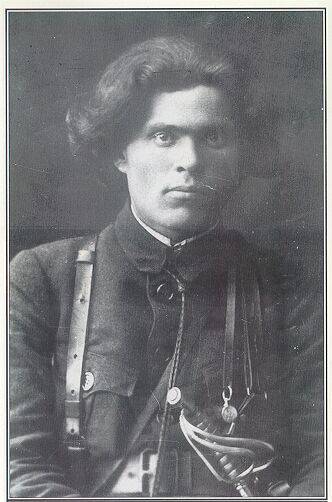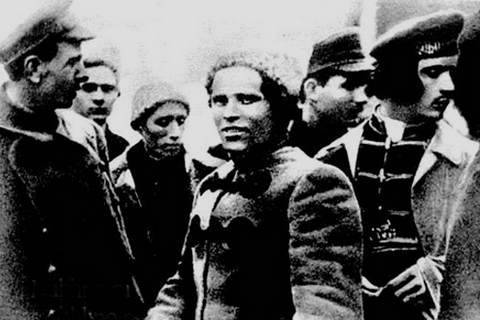Nestor Makhno: father of free-lance peasant, ideological anarchist or gangster?
 The life of this person is divided into three parts. The first is from birth to imprisonment for anarchist activities, the second is four years of continuous battles, hikes and treatments for numerous wounds, and the third is a thirteen-year stay in a foreign land.
The life of this person is divided into three parts. The first is from birth to imprisonment for anarchist activities, the second is four years of continuous battles, hikes and treatments for numerous wounds, and the third is a thirteen-year stay in a foreign land.Nestor Makhno was born on October 26 1888, in Gulyai-Polye, in the family of a former serf, a stable boy. Eyewitnesses claimed that during the christening of the priest the ryad caught fire, and he exclaimed in his heart that the baby would grow up “a robber who had never seen the light”. If we take into account all these components, there is nothing strange in the fact that an unsurpassed master of cavalry raids and battles emerged from the Maltz.
Studying at the district school was short-lived, and already in 10 years Nestor began to work - first, like a father, with horses, and then as a laborer. Subsequently, his fate was influenced by the 1905 revolution of the year, which caused a rather tangible wave of fascination with anarchism ideas. Young workers, disappointed in the activities of the Socialist-Revolutionaries and Bolsheviks, went into the ranks of the anarchist movement, whose center was Yekaterinoslav (Dnipropetrovsk).
Being a member of the anarchist "Union of poor grain-growers" in Gulyai-Pol, the guy did not have long. Money was needed for revolutionary activity, so the opposition to the tsarist regime extracted it with the help of expropriations — armed robbery of enterprises, banks, post offices and the bourgeois in general. After the police and postmen were killed, Nestor was arrested in August 1908, and a death sentence awaited him. The mother of the revolutionary wrote a letter to the mother of Tsar Nicholas II, Maria Feodorovna, with a request to reconsider the case, since Nestor was then considered a minor - he had not yet been 21 of the year.
The young man served in hard labor in the Moscow Central Prison - Butyrka. Among the political prisoners were many teachers and students, in the political disputes with which he formed his worldview. In the cell, the young prisoner got the nickname “Modest”, as his comrades repeatedly heard from him: “I will become a great man!” He spent seven years in the Butyrka prison and was released by the February 1917 revolution of the year.
In March, Nestor returned to his native village, Gulyay-Polye. He headed the local council and trade union of metalworkers and woodworkers, became a co-founder of the Peasant Union and organized a peasant self-defense detachment. And in 1918, the “Free Gulyai-Polish Republic” had its own rebel army. Makhno and his twin brothers fought with all who came to conquer the Zaporozhye steppes - the Austro-German army, Hetman Skoropadsky, Denikin and Wrangel, the Bolsheviks, the Entente and the Directory. And not only with them.
Taking Ekaterinoslav, Nestor Ivanovich, along with his headquarters, got drunk and got very drunk, and then began to amuse himself in the city park. Namely: the Makhnovists, seated on a swing and a merry-go-round, began shooting at the city dwellers, who had the misfortune to be dressed not in proletarian style and walk that day in the park. Well, while others staged a pogrom in the city. Then the sober Makhno shot dozens of the most malicious pogroms. Of course, not from their surroundings.
The first steps of the newly-minted republic were interrupted by the heavy stamping of the Austro-German army, which Skoropadsky invited to fight the Bolshevik troops advancing from the north. In late April, after Makhno was beaten out of Ukraine, he reached Moscow via Rostov, Saratov, and Samara. There he met with Sverdlov and Lenin, who was impressed (more than Lenin on Makhno). The fact of the meeting was long ignored by Soviet historians. Constructive conversation did not work. Nestor was interested in Lenin's attitude towards anarchism, and Lenin was interested in how anarchists could be used in the struggle against the Germans and Skoropadsky.
Makhno was more impressed by the meeting with the anarchist theorist Peter Kropotkin. He answered all the questions he was interested in and said, at parting, the words that Nestor remembered for the rest of his life: "Selflessness, firmness of mind and will on the way to the intended goal are conquered by all." Returning secretly to Gulyai-Polye, Makhno began an armed struggle against the hetman’s punitive detachments and German troops. Peasants came to him, dissatisfied with the return of the landowners, the liquidation of democratic institutions, and the requisition. After one victorious battle of 10 in October 1918, the rebels called their thirty-year-old commander "dad."

Makhno defeated thanks to original tactics and ingenuity. He first guessed to put the Maxim machine gun on a spring cart familiar from childhood of German colonists. Thus was born the legendary "tachanka." With a turning front axle and harnessed by four horses, she was a formidable force in battle. The military science of that time did not know such counter cavalry attacks: cavalry flew towards the enemy, and behind it — hundreds of machine gun carriages. Instantly, on command, the cavalry went to the side - and the enemy hit the wall of machine-gun fire. The machine gun regiments proved to be quite effective in the fight against the Don and Kuban cavalry of Denikin and Wrangel.
Twice in the struggle with them Old Man (Old Man) Makhno was an ally of the Red Army. And 4 June 1919 of the year in Gulyai-Polye was even granted by Klim Voroshilov to personally award Nestor with the Order of the Red Banner No. XXUMX. Twice he was outlawed, and his troops tried to destroy. Defending the peasants, he opposed the surplus, the self-will of the “check” and the commissars. The document adopted at the congress of representatives of peasants in Gulyai-Pola said: “The Soviet government is trying to take away their freedom from local councils ... We have not elected commissioners who monitor the activities of the councils and ruthlessly deal with undesirable ones. In practice, the slogan of the dictatorship of the proletariat means the monopoly of one party. ”
In the autumn of 1919, the number of Makhno troops under black flags reached one hundred thousand people. It was then that he made an alliance with Petliura, and his stab in the back of Denikin’s army largely decided the fate of the White movement. A year later, he helped the Bolsheviks take the Crimea: the Makhnovists were the first to force the Sivash, and immediately after that the Red Army began a war against them. Over the next ten months, Makhno carried out military campaigns in the Azov region, the Don and the Volga region, losing most of his troops.
With the defeat of Denikin and Wrangel, the Red Army threw all its might on the Makhnovists. Having suffered defeat, Makhno 28 August 1921, with the remnants of his troops - a detachment of 77 people, crossed the Dniester into Romania. He lived in Bucharest, then in Warsaw, and there, in September, 1923 was arrested on charges of preparing an uprising in Western Ukraine, but was acquitted by the court. After wandering in Poland and Germany, he lived in Torun, and in April 1925 moved with his wife and daughter to Paris, where he worked while he was strong, a turner, a printer, a shoemaker.
Nestor Makhno died in Paris on July 25 1934 of the year. His body was cremated and buried in the Pere Lachaise cemetery, in the wall of the columbarium, under the number 6686 - next to the Paris Communards.
For a long time, from Makhno they made a cinema ataman, unrestrained in a rage, unpredictable, capable only of senseless acts, not in any way connected with the people. Who was he really? Bandit? Then why did he have such support from the local population?
Everything is still a mystery. If we manage to solve the mystery of Nestor Makhno, then another key will be found to stories our past, and maybe the future.
Information